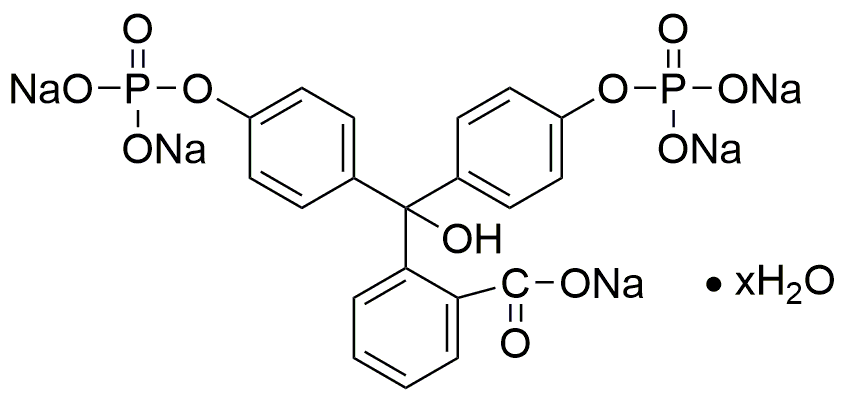Phenolphthalein diphosphate pentasodium salt hydrate is widely utilized in research focused on:
- Biochemical Assays: This compound serves as a pH indicator in various biochemical assays, allowing researchers to monitor pH changes in real-time, which is crucial for experiments involving enzyme activity and metabolic processes.
- Pharmaceutical Formulations: It is used in the development of drug formulations, particularly in controlled-release systems, where it helps in stabilizing active ingredients and enhancing their bioavailability.
- Analytical Chemistry: The compound is employed in titrations and other analytical methods to determine the concentration of various substances in solution, providing accurate and reliable results for quality control in laboratories.
- Environmental Testing: It plays a role in environmental monitoring, especially in assessing water quality by indicating the presence of certain pollutants, making it valuable for environmental scientists and regulatory agencies.
- Food Industry Applications: This chemical is also used in food testing to ensure the safety and quality of products by detecting acidity levels, which is important for food preservation and shelf-life studies.
General Information
Properties
Safety and Regulations
Applications
Phenolphthalein diphosphate pentasodium salt hydrate is widely utilized in research focused on:
- Biochemical Assays: This compound serves as a pH indicator in various biochemical assays, allowing researchers to monitor pH changes in real-time, which is crucial for experiments involving enzyme activity and metabolic processes.
- Pharmaceutical Formulations: It is used in the development of drug formulations, particularly in controlled-release systems, where it helps in stabilizing active ingredients and enhancing their bioavailability.
- Analytical Chemistry: The compound is employed in titrations and other analytical methods to determine the concentration of various substances in solution, providing accurate and reliable results for quality control in laboratories.
- Environmental Testing: It plays a role in environmental monitoring, especially in assessing water quality by indicating the presence of certain pollutants, making it valuable for environmental scientists and regulatory agencies.
- Food Industry Applications: This chemical is also used in food testing to ensure the safety and quality of products by detecting acidity levels, which is important for food preservation and shelf-life studies.
Documents
Safety Data Sheets (SDS)
The SDS provides comprehensive safety information on handling, storage, and disposal of the product.
Product Specification (PS)
The PS provides a comprehensive breakdown of the product’s properties, including chemical composition, physical state, purity, and storage requirements. It also details acceptable quality ranges and the product's intended applications.
Certificates of Analysis (COA)
Search for Certificates of Analysis (COA) by entering the products Lot Number. Lot and Batch Numbers can be found on a product’s label following the words ‘Lot’ or ‘Batch’.
Numéro de catalogue
Numéro de lot/série
Certificates Of Origin (COO)
This COO confirms the country where the product was manufactured, and also details the materials and components used in it and whether it is derived from natural, synthetic, or other specific sources. This certificate may be required for customs, trade, and regulatory compliance.
Numéro de catalogue
Numéro de lot/série
Safety Data Sheets (SDS)
The SDS provides comprehensive safety information on handling, storage, and disposal of the product.
DownloadProduct Specification (PS)
The PS provides a comprehensive breakdown of the product’s properties, including chemical composition, physical state, purity, and storage requirements. It also details acceptable quality ranges and the product's intended applications.
DownloadCertificates of Analysis (COA)
Search for Certificates of Analysis (COA) by entering the products Lot Number. Lot and Batch Numbers can be found on a product’s label following the words ‘Lot’ or ‘Batch’.
Numéro de catalogue
Numéro de lot/série
Certificates Of Origin (COO)
This COO confirms the country where the product was manufactured, and also details the materials and components used in it and whether it is derived from natural, synthetic, or other specific sources. This certificate may be required for customs, trade, and regulatory compliance.


